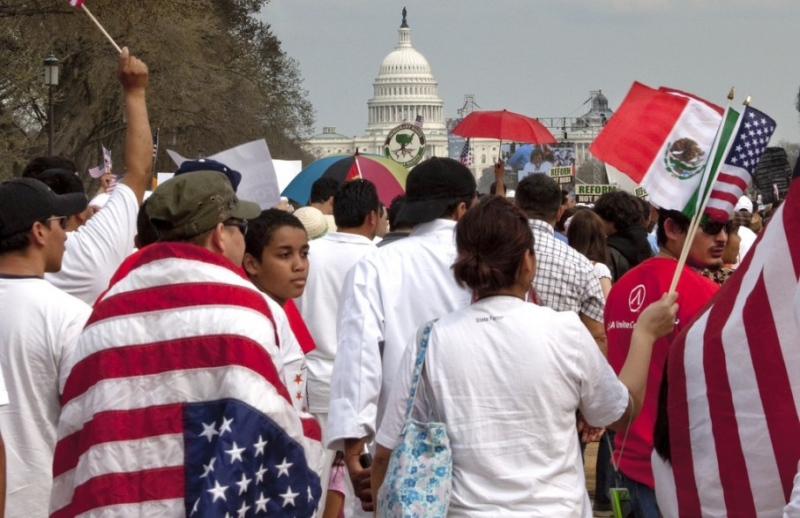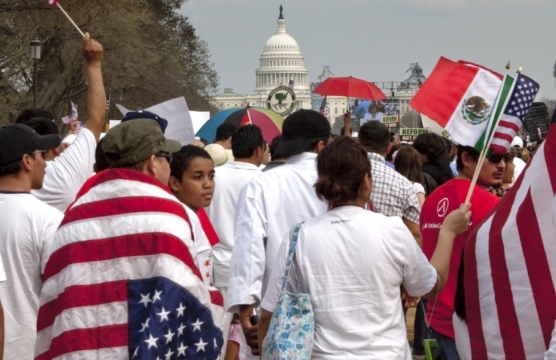Obama’s New Deportations Policy & the Future of Immigration
President Obama has overseen some of the strictest enforcement policies of the past several decades.
A Daily Publication of The Dialogue
Q: U.S. President Barack Obama last week announced a plan to protect as many as five million undocumented immigrants from deportation. Obama's plan has drawn sharp criticism from Republican lawmakers who accuse him of overstepping his authority as president. How will Obama's action affect U.S. relations with Latin American countries? Will Obama's move spur Congress to pass its own immigration reform, or will lawmakers focus on fighting the president's actions? What are the implications for businesses in the United States and Latin America?
A: Peter Hakim, member of the Advisor board and president emeritus of the Inter-American Dialogue: "Although President Obama never claimed any foreign policy objectives for his new immigration proposals, they have been applauded by Latin American leaders who consider them a welcome step toward ending the abusive treatment of Latino migrants and removing a major source of friction in their country's relations with the United States. No one, however, is fooled that the president's proposals are even close to a solution to the United States' broken immigration system. The new measures, at best, affect less than half of all undocumented migrants in the United States. They provide no path to citizenship and full equality, and can be readily reversed by Obama's successor. And much is still unknown, for instance, whether the procedures will be easy to navigate or filled with bureaucratic obstacles and long delays, whether Latinos will confront a new round of invective and insult from the opponents of reform and whether deportation procedures will be made more humane and give attention to the security challenges of Latin American countries. The longer-term impact in Latin America and the United States will depend on whether Obama's go-it-alone initiative ends up setting the stage for more pragmatic, humane and forward-looking immigration policies--or whether it generates a backlash from Republicans and an intense, partisan battle that sets back even further the prospects of a real solution."
A: Dan Stein, president of the Federation for American Immigration Reform (FAIR) in Washington: "President Obama's amnesty by executive decree endangers both the core interests of the American people and our constitutional system of government. Moreover, the scope of the amnesty is much broader than is being reported. Under the president's program, some five million illegal aliens will be eligible to compete legally with unemployed and underemployed Americans for every job in our economy. These mostly poorly-skilled workers will be eligible for a broad range of public benefits that will cost American taxpayers billions of dollars. Far from becoming taxpayers, they will become tax filers who, owing to low incomes, will be more likely to collect money from the Treasury from programs like the Earned Income Tax Credit than become tax contributors. The president's actions also undermine the constitutional separation of powers. Every president has been frustrated by Congress' failure or refusal to pass legislation he dearly wants. There is nothing in the Constitution that authorizes a president to ignore existing statute and substitute his own policies in those circumstances. It is a slippery slope that ought to frighten even those who agree with his policy objectives. What has received less attention is that the policy will grant de facto amnesty to nearly all illegal aliens. Five million illegal aliens will get deferred action and work authorization. But an accompanying DHS memo adds that 'those who entered illegally prior to January 1, 2014...will not be priorities for removal.' In other words, only violent criminals and those in the country less than one year will be subject to enforcement."
A: Arturo Sarukhan, board member of the Inter-American Dialogue and former Mexican ambassador to the United States: "In the course of the nation's history, all big achievements in U.S. domestic and foreign policy have occurred on the backs of bipartisanship and of Congressional co-stakeholdership with the White House. So not much can be said as to why President Obama's executive action of last week providing deportation relief to close to five million undocumented migrants, despite unequivocally being the right decision, speaks volumes as to how broken and dysfunctional governance has become in Washington. It will certainly not suffice in solving the challenge of immigration nor exempt the need for Congressional bipartisan action in passing comprehensive legislation that will, among other things, tackle the need for legalizing agricultural workers and providing long-term legal and orderly circular labor mobility for skilled and unskilled individuals alike, an issue which the president's decision did not address. Nor should it provide an excuse for Republicans to once again dodge the hard questions they need to answer regarding this issue, more so now that they will control Congress. Will they put forward their own vision on immigration, of how immigration strengthens the economy and social fabric of the United States, and how to fix a broken system? Moreover, it is not the president's job to save Republicans from some of their own. It is, therefore, now Congress' turn, and in particular the GOP's turn, to show that it can embrace the values, aspirations and the future of this great nation. Evidently, President Obama's decisions on this issue now and in the past have been and are about politics. But doing the right thing IS good politics. The president's executive action on immigration means that overnight, undocumented migrants will have a face and a name. Beyond process and politics, the president's decision is about people. People we actually know. So, in sum, kudos to the president."
A: Louis DeSipio, professor of political science and Chicano/Latino studies and director of the Center for the Study of Democracy at the University of California, Irvine: "If effectively implemented, President Obama's executive actions on immigration will offer some of today's long-term unauthorized immigrants more security and greater protections in the workforce. What they will not lead to, at least in the foreseeable future, is Congressional action on comprehensive immigration reform. Immigration reform is likely stalled until the early 2020s, at the earliest. The Republican leadership has long sought passage of a comprehensive immigration reform. Speaker Boehner famously indicated after the 2012 elections that immigration reform 'has been around far too long. A comprehensive approach is long overdue, and I'm confident that the president, myself and others can find the common ground to take care of this issue once and for all.' The Senate acted on this promise with the strong bipartisan support for S. 744 in 2013. What has impeded Congressional passage of immigration reform is a plurality of the House Republican caucus who will not consider any immigration reform with a path to legal status for unauthorized immigrants. President Obama's executive actions certainly have won no converts among these restrictionist House Republicans (or their more moderate colleagues) and likely have further entrenched House Republican opposition to comprehensive immigration reform. Speaker Boehner could likely pass a bill with the votes of most House Democrats and some moderate Republicans, but he has chosen not to follow this path. Comprehensive immigration reform will require a significant shift in the membership of the House, a shift that will likely only occur after the redistricting following the 2020 census."
President Obama has overseen some of the strictest enforcement policies of the past several decades.
As the global financial crisis continues to alter US relations with the hemisphere, greater engagement in the region remains critical to US interests.
Everyone recognized that the immigration system was a mess and needed to be fixed, but the politics were too polarized and complicated for any serious progress to be made.
 Victoria Pickering / CC BY-NC-ND 2.0
Victoria Pickering / CC BY-NC-ND 2.0
